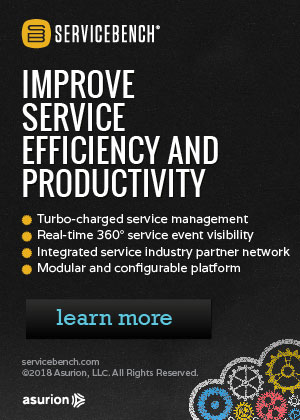Fleet Warranties:
Among companies that operate fleets of hundreds or even thousands of vocational vehicles, service contracts are rarely bought. Some ask their manufacturers for longer warranties, but most prefer to fix their trucks and buses themselves. And what they like to outsource isn't so much the repair labor as it is the labor associated with warranty claims submission.
As we continue our tour of the vehicle service contract industry, we've found a sector of the market where they don't really exist.
Although the makers of vocational trucks and transit buses are willing to negotiate a lengthening of their warranties for additional years, what's sold as an extended warranty or a vehicle service contract for passenger cars and light trucks is nowhere to be found among fleet operators.
The manufacturers seem to have a small business going, selling extended warranties and service contracts to customers who want them. Some also involve their dealers. But the traditional third party administrators and insurance companies that dominate the consumer auto space are nowhere to be found.
Many fleet operators, in fact, prefer to do their own repairs, even on new vehicles that qualify for warranty coverage. They'll gladly use the manufacturer's parts, but they prefer to use their own labor, and then bill the manufacturer for that labor. In such an environment, there's little room for services that will essentially outsource that warranty work to a repair shop, administrator, and underwriter.
There is, however, room for the actual warranty claims processing operation to be outsourced to a third party. Richard Matosky, president of Cascor Inc., said his company has been doing this since 1992. After the fleet operator completes a repair, the paperwork is handed over to Cascor, to check whether it's covered by warranty (or extended warranty), and if so, to submit the claim to the manufacturer.
No Sign of Extended Warranties?

In all his time in the business, though, Matosky said he has yet to see what would be called an extended warranty or a vehicle service contract, at least in the form in which they are sold to passenger car buyers. Yes, the truck and bus companies will sell extensions to their product warranties, but no, there is no room for third parties.
"I think it's due to the way vehicles are used on the commercial fleet side of things," he said. Simply put, they're driven constantly, break frequently, and would be expensive to buy (especially if the customer is also performing the repairs). And using outside labor is a non-starter for many fleet operators, for a variety of reasons.
"I'm not aware of -- although I'm sure they exist -- extended warranties/service contracts beyond what OEMs offer to their fleets," Matosky added. And even those OEM-provided extended warranties are not runaway hits within his customer base, he said.
Matosky noted that Cascor now has around 45 customers, consisting of major utilities and municipalities, that maintain and repair their own fleets of vehicles, but look to Cascor for help with the warranty claims paperwork. And none seem to have an appetite to cover mechanical breakdowns with a service contract from a third party.
"If they purchase extended warranties, which most do not, it's directly from what the OEMs and the component manufacturers will offer at the time of vehicle purchase," he said. But either because the OEM fears that the vehicles are going to be used in extreme conditions, or because the utility or the city believes it's more cost-effective to self-repair after the basic warranty expires, they usually don't purchase an extended warranty.
Becoming the Warranty Department
Matosky said Cascor functions much like the fleet owner's in-house warranty administration department would. The company identifies repairs that are covered by warranties, and submits the claims to the manufacturer(s), following each manufacturer's policies and procedures.
When Cascor opened for business 18 years ago, it identified utilities, trucking companies and municipalities as the best prospects for its warranty outsourcing services. Among the utilities that the company has named as clients on its web site are: American Electric Power Co.; Commonwealth Edison; DTE Energy Co.; Exelon Corp.; National Grid plc; Northeast Utilities; PECO Energy Co.; PPL Corp.; Progress Energy Inc.; Sempra Energy; Southern California Edison Co.; Southern Co.; and Xcel Energy Inc.
Municipal clients include the cities of Cincinnati; Minneapolis; Philadelphia; and Seattle; and both Miami-Dade County and Palm Beach County in Florida.
The main reason they outsource their warranty departments to Cascor has to do with the diversity of their fleets, Matosky said. "A utility can have upwards of four or five different OEMs," he said, "which would require them to have in-house warranty administration resources on at least four or five different OEMs' policies and procedures -- how to properly identify, code, and properly submit to those OEMs. And that's not an easy skill set to find."
Secondarily, the utilities and municipalities are more concerned with making sure their vehicles are operational than they are with the paperwork that follows the repairs. Their core competency is making sure the fleet is in good shape. That's the skill set they value. Warranty reimbursements are literally an afterthought.
Meanwhile, that's Cascor's core competency. "Our skills are in the evaluation of repairs that are done on a daily basis by a fleet, against the warranties that they purchased, and properly coding and submitting and reconciling those claims, so that a fleet can maximize the warranty recovery it's entitled to," Matosky said.
Submitting Claims to OEMs
The top OEMs to which Cascor's clients submit claims reads like a who's who of the medium and heavy truck industry: Ford, General Motors and Chrysler, of course, as well as Daimler's Freightliner Trucks, Navistar's International, and Paccar's Peterbilt, and in engines, Cummins and Caterpillar. All of these OEMs are essentially allowing some of their best customers to do their own warranty work, as long as the mechanics are certified.
That's a model that is also common in the airline industry, where Boeing, Airbus, Bombardier, Embraer and others allow their customers to perform the labor portion of their warranty claims themselves. And, the expert assistance of outsourcing services also helps some of those airlines submit their claims.
In most of the consumer-oriented sectors of the warranty industry, however, customer self-repair is primarily a cost-saving measure, as when a computer company ships a new disk drive to a desktop PC owner along with instructions on how to install it. If required, the customer can call in and a technician will guide them as they attempt the repair. But pay them for their time and effort? That's just not done.
In cases where the customer has paid for an extended warranty and possibly a premium service level for that service contract (such as next-day repair), these self-repair options are seen as something of a swindle. In one state, in fact, a computer company was recently sued for forcing its customers to self-repair their units, which were under warranty (or a service contract).
But among fleet operators such as utilities, cities, and airlines, they would want it no other way. Whether it's for the sake of pride, logistics, uptime, cost, or union rules, they'll prefer to do the repairs themselves, in-house.
Matosky said there are still lots of fleets that do their own in-house warranty administration, and do it well. Some buy extended warranties from their OEMs to keep their equipment covered for additional years. But they're always going to have to employ a fleet of warranty clerks that are adept at submitting claims to each of the OEMs. And that's always going to be a cost.
Extended Warranty Revenue?
Extended warranty service revenues are not usually identified as such by those OEMs. Caterpillar reports that nearly nine percent of its total revenue comes from financial and insurance products, but doesn't detail what those products are. Cummins reports $109 million in deferred revenue on extended warranty contracts sold in 2009 -- about one-third as much as its reported product warranty expense and about one percent of its total sales.
Navistar reports its warranty claims and extended warranty deferred revenue together, but reports that around three percent of its total revenue comes from financial services. Paccar also mixes the two together, but reports that more than twelve percent of its total revenue comes from financial services.
For these four manufacturers, this adds up to more than $4.3 billion in service revenue in their most recent fiscal years, and almost seven percent of their total revenues. Of course, it's not all extended warranty revenue -- Cummins' one percent or even Navistar's three percent are more in the realm of possibilities than Cat's nine percent or Paccar's twelve percent.
We'd suggest that each year, these four companies earn back roughly half the $2.1 billion they spend on product warranties in deferred revenue derived from extended warranty sales. That's only 1.7% of their total revenue, but it's still over a billion dollars a year.
Negotiated Warranties
With many large fleet sales, it's more common to see a longer warranty negotiated as part of the deal itself. For instance, New Flyer Industries Inc., a major bus manufacturer based in Winnipeg, recently announced a deal to provide the City of Ottawa with 306 new articulated clean diesel buses for approximately CA$190 million. Deliveries are expected to start in August 2010, and to be completed within a year. As part of the deal, the City of Ottawa is trading in 226 used buses, which New Flyer will then refurbish and resell.
Scott Halbesma, director of the service organization at New Flyer, said the City of Ottawa negotiated five-year/200,000-mile warranties. A press release issued by the company called them "extended warranties," but Halbesma said that use of those words refers to the extra-long duration of the warranties rather than to the way the term is used in the passenger car industry, as a synonym for service contracts.
"Our industry has traditionally offered a base warranty of one year/50,000 miles," he said. "And currently we see our customers looking for additional warranty coverage, especially as their operating budgets are under pressure. Extensions of the base warranties as well as special extra warranties for selected subsystems are being investigated, resulting in increasingly complex tracking and administration requirements."
At the present time, New Flyer does not widely sell extended vehicle or component warranties. Instead, the company will work with the transit authorities to customize the warranty and make it unique to their requirements and operation profile. And it will adjust the prices quoted in its bid accordingly, to reflect the changes in expected future warranty costs. So the final terms and conditions of the warranty will reflect the outcome of that negotiation, based on what the customer and New Flyer agree upon.
In-House Labor Preferred
"It's very challenging for us, especially with respect to process," Halbesma said. "As the largest heavy duty transit bus manufacturer in Canada and the U.S., New Flyer deals with a large variety of customers and in particular, many of the larger transit bus agencies. Although some of them request external labor assistance, we have limitations due to their existing union agreements." The unions generally don't like outsiders to do repair work.
"The industry has always relied on its end users to do a lot of that warranty work," Halbesma said. The reason is simple: while the life of the warranty may be one to perhaps five years, the life expectancy of the bus will be 12 to perhaps even 18 years. So after the warranty expires, the municipality will need a trained workforce to take care of those repairs for an additional decade or more.
It sounds as if service contracts just don't make sense in such an industry, nor do other schemes that outsource repair services. Think of it this way: warranties cover new units. Service contracts continue to cover them into middle age. And then in old age, it's up to the customer to handle repairs themselves. But municipalities want a labor force trained to repair the vehicles throughout their entire lifecycle, not just their final years on the road. That's their core business: keeping the buses running.
Web Interface for Customers
Another thing Halbesma said he doesn't see any need for is outside help with the submission of claims. The web interface created by 4CS Inc., New Flyer's warranty software vendor (and a sponsor of this newsletter) is easy enough for customers to operate, he suggested.
"New Flyer has invested significantly in the development of our warranty claim and campaign management system. We actually worked with 4CS as a partner to create our own version of iWarranty, so that our customers could submit warranty claims through the Internet," he said. "The challenging thing for us was to create a system that works for everybody." And when it comes to warranty work, everybody is different.
If New Flyer sold through dealerships, Halbesma said, it would have been relatively easy for the company to decide how that system should work. It would have decreed that all dealers performing warranty work must submit their warranty claims within 30 days. But New Flyer doesn't sell through dealers, and each customer's warranty terms and conditions are negotiated. For some the deadline is 30 days, while for others it's 64 days.
"So it was very challenging for us to create a system that could really work amongst all these different warranty permutations within our customer base, while at the same time being directly linked with our suppliers, who underwrite many of the warranty programs" he said. "However, we believe that the iWarranty system is world class, and it allows our customers complete visibility of their claims. We can communicate back and forth with both customers and suppliers. So when a customer submits the claim, and if we see something we might need their clarification on, then we send it back to them."
Happy Memorial Day Weekend!
Because of the approaching Memorial Day weekend, Warranty Week will not publish a newsletter next week. See you after the one-week break on June 3rd!









